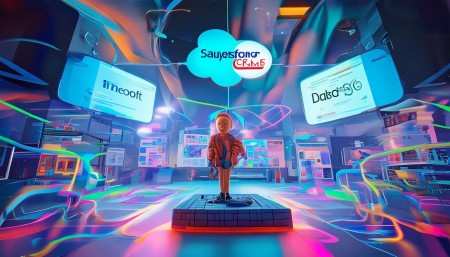
△Click on the top right corner to try Wukong CRM for free
So, you know how businesses these days are always trying to figure out how to keep their customers happy and coming back? Yeah, well, that’s where CRM software comes in—Customer Relationship Management, if you want the full name. Honestly, it sounds kind of fancy, but really, it’s just a smart way for companies to organize all their customer interactions, sales data, support tickets, and basically anything that helps them understand what their customers need.
Now, I’ve been looking into this whole world of CRM software development lately, and let me tell you—it’s not just one or two big players running the show anymore. There’s actually a whole ecosystem of companies out there building these tools, each with their own flavor, their own strengths, and honestly, their own quirks too.
Free use of CRM system: Free CRM
Take Salesforce, for example. You’ve probably heard of them—they’re kind of like the poster child of CRM. They started way back in the late '90s, right when cloud computing was still this wild new idea. And guess what? They bet everything on it. Instead of making software you had to install on your computer, they said, “Hey, why not just run it online?” And honestly, that was genius. Now, almost every medium to large company uses Salesforce for something—sales tracking, marketing automation, customer service—you name it.
But here’s the thing: Salesforce isn’t the only game in town. Not even close. Microsoft jumped into the CRM space with Dynamics 365, and honestly, it makes sense when you think about it. A ton of businesses already use Microsoft Office, Outlook, Teams—so why not plug in a CRM that works seamlessly with all that? It’s like having your calendar, email, and customer database all talking to each other. Pretty convenient, right?

Then there’s HubSpot. Now, this one’s interesting because they started as more of a marketing-focused platform. But over time, they expanded into sales, service, and even operations. What I really like about HubSpot is how user-friendly it is. If you’re a small business or a startup without a huge IT team, HubSpot doesn’t make you feel like you need a degree in computer science just to set it up. Plus, they’ve got this freemium model, so you can start small and grow into it.
And speaking of startups, there are tons of smaller CRM developers popping up all the time. Some focus on niche markets—like real estate agents, e-commerce stores, or healthcare providers. These companies often build tools that are super tailored to specific industries. For instance, I came across this one CRM built just for dental clinics. It tracks patient appointments, handles billing, reminds patients about cleanings—basically everything a dentist’s office would need. It’s not flashy, but man, does it solve real problems.

Of course, building CRM software isn’t as simple as slapping together a few forms and calling it a day. These platforms have to handle massive amounts of data, stay secure, integrate with other tools, and be easy enough for non-tech people to use. That’s why most of these companies invest heavily in research, design, and ongoing updates. Think about it—your CRM might need to pull data from your website, connect to your email provider, sync with your accounting software, and even talk to your social media accounts. That’s a lot of moving parts!
One thing I’ve noticed is that AI is becoming a bigger deal in CRM development. Like, imagine your CRM not just storing customer info, but actually predicting which leads are most likely to buy, or suggesting the best time to follow up with a client. Companies like Salesforce and Oracle are pouring money into AI features—things like Einstein AI or Adaptive Intelligence—to make their platforms smarter. And honestly? It’s kind of impressive. I saw a demo once where the system automatically summarized a week’s worth of customer emails and flagged the urgent ones. No human had to read through hundreds of messages. Just… wow.
Security is another huge concern. I mean, you’re dealing with personal data—names, emails, phone numbers, sometimes even payment info. So these CRM companies have to take security seriously. Most of them use encryption, multi-factor authentication, regular audits, and compliance with standards like GDPR or HIPAA, depending on who they serve. It’s not just about protecting data; it’s about trust. If a business can’t trust its CRM provider, they won’t use it.
Integration is another big selling point. Nobody wants to juggle ten different apps that don’t talk to each other. That’s why most CRM platforms now come with APIs—those are like digital bridges that let different software systems share information. Zapier, for example, has become super popular because it lets you connect your CRM to hundreds of other tools without writing code. So if someone fills out a form on your website, Zapier can automatically add them to your CRM, send a welcome email, and notify your sales team—all without anyone lifting a finger.
Pricing models vary a lot too. Some companies charge per user per month, others offer tiered plans based on features, and some even have pay-as-you-go options. HubSpot, for instance, gives you a free version with basic features, then charges more as you need advanced tools. Salesforce, on the other hand, tends to be pricier, especially when you start adding on all the extra modules. But hey, you get what you pay for, right?
Another trend I’ve seen is mobile optimization. People aren’t sitting at desks all day anymore. Sales reps are on the road, customer service agents are working remotely, and managers are checking reports from their phones during lunch. So CRM developers are making sure their apps work smoothly on smartphones and tablets. Being able to update a deal status or respond to a support ticket from your phone? That’s a game-changer.
Customer support matters too. When your CRM goes down or you can’t figure out how to do something, you want help fast. That’s why companies like Zoho and Freshworks emphasize strong customer service. They offer live chat, phone support, knowledge bases, and even community forums where users can help each other. It’s not just about the software—it’s about the whole experience.
Oh, and customization! This is a big one. Every business is different, so a one-size-fits-all CRM rarely works perfectly. That’s why many platforms allow you to customize fields, workflows, dashboards, and reports. Some even let you build custom apps within the CRM using low-code tools. It gives companies the flexibility to shape the software around how they actually work, instead of forcing them to change their processes to fit the software.
Now, competition in this space is fierce. New players emerge all the time, and even the big names are constantly updating their products to stay ahead. Innovation moves fast—what was cutting-edge last year might already feel outdated. That’s both exciting and a little overwhelming, if I’m being honest.
But at the end of the day, all these CRM companies are trying to solve the same core problem: helping businesses build better relationships with their customers. Whether it’s through automation, analytics, personalization, or just keeping everything organized, the goal is the same—make it easier to serve people well.
And honestly, when you think about it, that’s kind of beautiful. All this technology, all these lines of code, all these servers and algorithms—they’re not just about efficiency or profits. They’re about connection. About remembering a customer’s name, understanding their needs, and making them feel valued. That’s what good CRM is really about.
So yeah, the world of CRM software development is huge, diverse, and constantly evolving. From tech giants to scrappy startups, from AI-powered insights to simple contact management—there’s something out there for almost every kind of business. And as long as companies want to treat their customers better, this industry isn’t going anywhere.
FAQ (Frequently Asked Questions):
Q: What exactly does a CRM software development company do?
A: Well, they design, build, and maintain software that helps businesses manage their interactions with customers. That includes tracking sales, handling support requests, automating marketing, and analyzing customer data.
Q: Is CRM software only for big companies?
Not at all! While big corporations use powerful (and expensive) systems like Salesforce, there are plenty of affordable and simple CRMs perfect for small businesses and solopreneurs—HubSpot and Zoho come to mind.
Q: Can CRM software integrate with other tools I already use?
Absolutely. Most modern CRMs can connect with email, calendars, websites, social media, and even accounting software through integrations or APIs. Tools like Zapier make this even easier.
Q: Do I need technical skills to use CRM software?
Not really. Many platforms are designed to be user-friendly, with drag-and-drop interfaces and guided setup processes. Of course, more complex systems might require some training, but most offer tutorials and support.
Q: How do CRM companies handle data privacy?
Reputable CRM developers take data security very seriously. They use encryption, comply with privacy laws like GDPR, and often undergo third-party audits to ensure your data stays safe.
Q: Are there CRMs made for specific industries?
Yes! Some CRMs are built specifically for real estate, healthcare, education, nonprofits, or e-commerce. These often include features tailored to the unique needs of those sectors.

Q: What role does AI play in modern CRM systems?
AI helps automate tasks, predict customer behavior, suggest next steps, and analyze large amounts of data quickly. For example, it might recommend the best time to call a lead or flag a customer at risk of leaving.
Q: Is cloud-based CRM better than on-premise software?
Most people prefer cloud-based CRMs today because they’re easier to update, accessible from anywhere, and usually cheaper to maintain. On-premise solutions are still used in some cases, especially where strict data control is needed.
Q: Can I try a CRM before buying it?
Definitely. Most companies offer free trials or freemium versions so you can test the software and see if it fits your needs before committing.
Q: How do I choose the right CRM for my business?
Start by identifying your main goals—better sales tracking? Improved customer service? Marketing automation? Then look for a CRM that excels in those areas, fits your budget, and is easy for your team to adopt.
Related links:
Free trial of CRM
Understand CRM software

△Click on the top right corner to try Wukong CRM for free